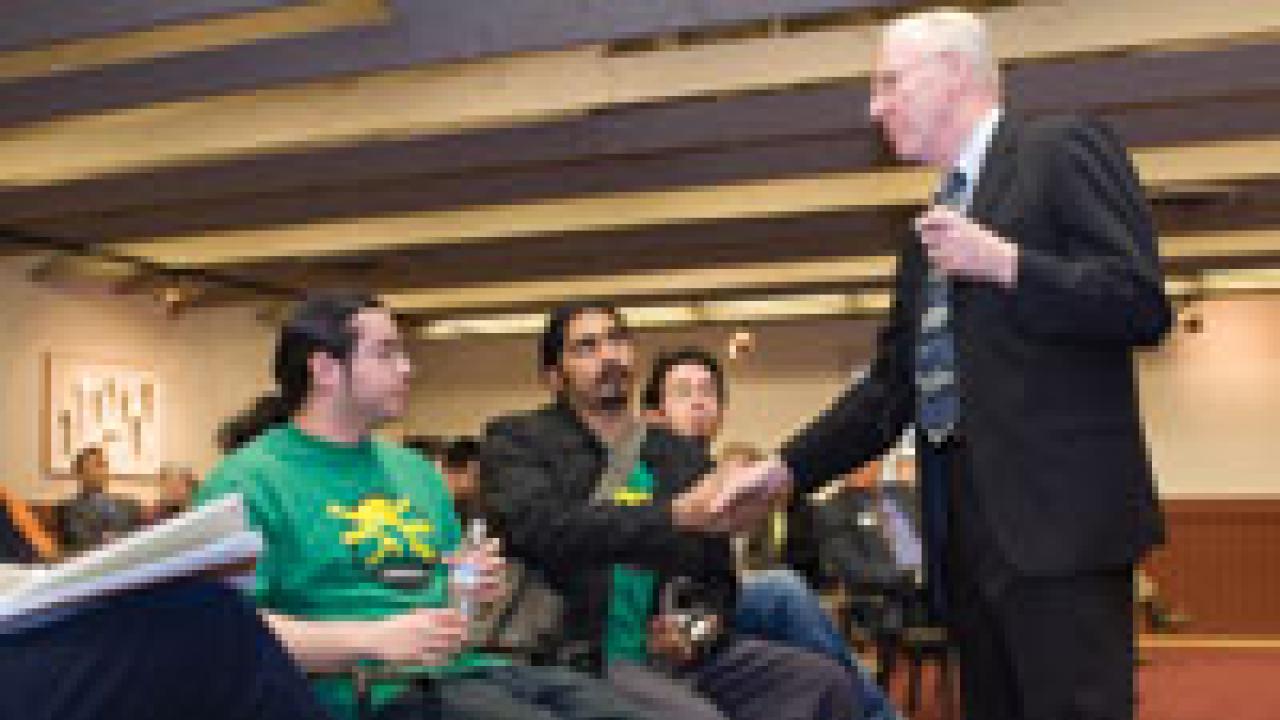Chancellor Larry Vanderhoef used his quarterly brown bag chat last week to deliver positive messages about faculty recruitment, the Principles of Community and students' progress toward degrees.
He also spoke about Gov. Schwarzenegg-er's proposed budget for 2007-08, saying the governor lived up to his compact for increased UC funding but that students are likely to be charged higher fees.
Outside and inside the noon-hour forum at the Silo, union demonstrators delivered a message of their own, saying UC Davis food service workers should be made UC employees with prospects of better pay and benefits.
Before engaging several of the demonstrators publicly in an orderly discussion, the chancellor delivered remarks on these topics:
Budget — The governor's spending plan permits enrollment growth of 5,000 students throughout the UC system, said Vanderhoef, who added that the Davis campus anticipates returning to more modest growth after this year's record-size freshman class of 5,511.
Schwarzenegger proposed an allocation of $3.27 billion for UC, an increase of $192 million, or 6.2 percent, compared with this year. Legislative debate on the spending plan is expected to begin in earnest after the governor issues a revision in May.
At this point, there is no provision for a "buyout" like the one that wiped out this year's planned fee increases for students who are California residents. Without such a buyout for 2007-08, the Board of Regents next week is expected to consider an increase of roughly 7 percent for educational and registration fees, and up to 10 percent for professional degree fees.
Once again, the governor omitted money for academic preparation in kindergarten through 12th grade, and Vanderhoef said UC will once again work to have this money restored — something at which UC was successful last year.
Faculty recruitment — Vanderhoef said the recently announced "pause" in hiring at UC Davis will affect only about 25 growth positions in the coming year, while the university engages in academic planning. "We have to have a good sense of where we are heading," he said.
Hiring will continue, Vanderhoef stress-ed, to fill the 60 to 75 slots expected to be vacated by retirement. Also, he said, the campus continues to recruit for faculty positions allocated in recent years but not yet filled.
The pause, he said, "is not a freeze."
Minimum progress toward degree — Vanderhoef noted that this requirement had recently been modified to address faculty concerns.
Student progress toward graduation is now examined in the spring, a switch that gives students the opportunity to enroll in summer courses to help meet the requirement. Also, the university established probationary status to go along with subject-to-dismissal status.
And, the chancellor said, "degree progress average" is based on a student's entire academic career. Thus, students with a "bad quarter" can still meet the requirement, based on past progress, the chancellor said.
"While there was initial concern about the number of students who might be affected last spring quarter, the actual number of students dismissed for minimum progress at the end of fall was less than 70," Vanderhoef said.
Principles of Community — Vanderhoef said the principles emerged 16 years ago from a desire to see people respect others on campus not only in terms of race and gender, but also for their ideas.
"Everyone had to have a chance to have their say, to have their point known," the chancellor said. "Everyone should have the obligation to understand these other points of view."
The Principles of Commun-ity have become "a central part of how we on campus believe we should be acting, group to group, person to person," Vanderhoef said.
The principles are not law, he said, simply suggestions about how we should behave. The principles are not meant to get everyone to agree with one another, but to ensure that we listen to other people's views.
Vanderhoef did exactly that — listen — when union demonstrators rose to speak during the comment portion of the brown bag.
The demonstrators were among some 150 people who had gathered outside the Silo, some holding picket signs and beating drums, and nearly all chanting
"UCD, you need me." Just after noon, they marched into the Silo and headed for the stairs leading to the chancellor's brown bag in the Cabernet Room.
With campus police standing by, and the room too small to accommodate the entire crowd, only a dozen or so of the demonstrators entered the meeting.
The remainder went back outside to continue their picketing and chanting.
Julian Posadas, executive vice president of Local 3299 of the American Federation of State, County and Municipal Employees, urged the UC Davis administration to make a decision about the campus's food service workers, to take them off the Sodexho payroll and put them on the UC payroll.
No other UC campus or medical center contracts out for food servic personnel.
The brown bag gave two Sodexho employees a platform to voice their complaints about the company. Executive Vice Chancellor Dennis Shimek responded that he was not aware of Sodexho's doing anything like what the workers alleged.
Shimek, in charge of Human Resources, said he had met with the union and Sodexho employees in the past, and is committed to do so again. Indeed, he said in an e-mail to Dateline this week that the union had contacted him about a meeting.
"I will be meeting with campus management and Sodexho to discuss all of the issues and in particular the items raised at the brown bag," Shimek told Dateline.
Media Resources
Clifton B. Parker, Dateline, (530) 752-1932, cparker@ucdavis.edu
